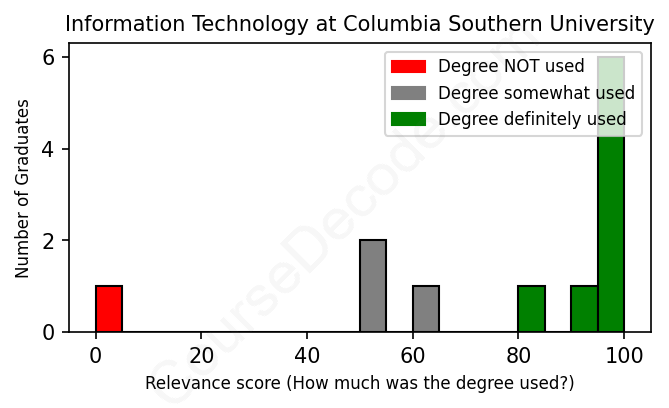
First, some facts. Of the Information Technology graduates from Columbia Southern University we've analyzed , here's how many have used (or NOT used) their degree in their career:

These are estimates based on AI analysis of 12 LinkedIn profiles (see below).
The verdict? Above average. Overall, with an average relevance score of 77%, Information Technology graduates from Columbia Southern University have a higher likelihood (+10%) of finding work in this field compared to the average graduate across all fields:
And for comparison, here's the chart for all profiles we've looked at across all degrees.
Also, after graduating, 41% of these graduates have pursued further education other than another Bachelor's degree (such as a Masters degree or other), compared to the average across all profiles of 35%. This suggests you may need more than just a Bachelors degree to be competitive as a Information Technology graduate.
See the details:
|
Relevance score: 100% We think this person has gone into a career highly relevant to their degree. We think this person has gone into a career highly relevant to their degree.
DEGREE INFOGraduated in 2016 from Columbia Southern University with a Bachelor of Science - BS in Information Technology. Also pursued further education since (see below). JOB HISTORY SINCE GRADUATIONCyber Deloitte Jul 2021 - Present FURTHER DEGREES DONE SINCE GRADUATINGMaster's degreeWestern Governors University 2018 - 2019 ABOUTI have been an active duty U.S. Navy IT for the past 10 years. I have extensive experience in multiple facets of information technology to include cybersecurity, system administration, hardware/software management, satellite communications, and knowledge management. I have a M.S. in Cybersecurity and Information Assurance from WGU. I currently hold a TS/SCI clearance. |
The top 10 most common jobs done by the graduates we've analyzed (ranked most common to least) are:
When looking at the career paths of graduates from Columbia Southern University with a degree in Information Technology, it seems like there's a pretty mixed bag of jobs. Some graduates have landed roles that clearly leverage their IT skills, like Information Systems Security Officers, Database Developers, and IT Managers. These positions tap directly into the technical know-how they gained during their studies, making them highly relevant and integral to their success in the tech field.
However, there are quite a few graduates who have found themselves in roles that aren't very related to Information Technology at all. Positions like managers in retail or analysts whose work is more about finances than IT don't seem to gather much from their IT education, leading to a disconnect between schooling and the actual job functions. While some jobs do require analytical or management skills that could be beneficial, the majority of positions taken don’t directly engage with the technical aspects of IT that they'd have studied, which might leave some graduates feeling like they're not using their education to its fullest potential.
Here is a visual representation of the most common words in job titles for Information Technology graduates (this is across all Information Technology graduates we've analyzed, not just those who went to Columbia Southern University):

Graduates from Columbia Southern University's Information Technology program seem to have varied career trajectories, with many individuals finding success in roles that are closely related to their degrees. A significant portion of these alumni have taken on positions in information security, systems management, and IT analysis shortly after graduation. For instance, those who graduated around 2016 have gone on to roles such as Cyber professionals at Deloitte and project managers in government organizations. This trend indicates that many graduates are launching their careers in the tech field, often transitioning smoothly into relevant roles within just a few years of completing their studies.
However, it's worth noting that there are also cases where individuals seem to have strayed from the tech path. For example, one graduate in 2012 started their career as a manager in a convenience store and has remained in that industry. Meanwhile, others who studied IT found positions in non-tech-related roles, such as a cost analyst at OnPoint Industrial Services. Overall, while many alumni carving out solid careers in IT demonstrate the potential for strong job placement in the field, not everyone has followed a traditional IT career path, with some taking on roles unrelated to their degrees. It’s a mixed bag, but the success stories are definitely more prevalent among those who have remained dedicated to the tech sector.
Honestly, pursuing a Bachelor’s degree in Information Technology at Columbia Southern University or anywhere else can be a mixed bag. It might be a bit easier than some traditional programs, especially since Columbia Southern offers a lot of flexibility with online learning, which can help if you're juggling work or other commitments. However, don’t get it twisted—there are definitely some challenging courses and concepts, especially in things like networking, programming, and cybersecurity. If you stay organized and put in the effort, you should be able to handle it, but it’s not just a walk in the park. So, if you like tech and are willing to put in the work, you should be fine!
Most commonly, in the LinkedIn profiles we've looked at, it takes people 2 years to finish a Bachelor degree in Information Technology.
Looking at these Columbia Southern University graduates, it seems like there's a mixed bag when it comes to how much money they're making. Some folks, especially those in the military or working for established firms like Georgia Tech and Deloitte, likely have decent salaries given their career progression and titles, like "Branch Chief" or "Cyber," which usually come with good pay. But then you've got others who are still working in more entry-level roles long after graduation, like those at Casey's, which probably doesn't pay as well. Overall, while some of these graduates seem to be on a solid financial path, others might still be trying to climb the ladder to that comfy paycheck.
Here is a visual representation of the most common words seen in the "about" section of LinkedIn profiles who have a Bachelor degree in Information Technology (this is across all Information Technology graduates we've analyzed, not just those who went to Columbia Southern University). This may or may not be useful:

Here are all colleges offering a Bachelor degree in Information Technology (ordered by the average relevance score of their Information Technology graduates, best to worst) where we have analyzed at least 10 of their graduates: